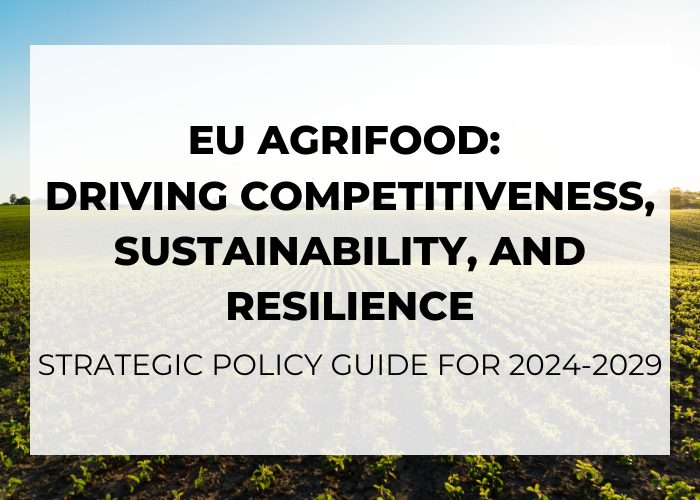EU Agrifood: Driving Competitiveness, Sustainability, and ResilienceSTRATEGIC POLICY GUIDE FOR 2024-2029
- 8 May 2024
- Posted by: Competere
- Categories: highlights, News, Position Papers

Competere presents the Strategic Policy Guide for 2024-2029, tailored specifically for the European agrifood sector. These essential principles are intended to garner support from future representatives in the European Parliament, serving as a roadmap for their endeavors ahead. Dive into the full text below or download it here >>>
Are you ready to pledge your support for these principles? Email us!
EU AGRIFOOD: DRIVING COMPETITIVENESS, SUSTAINABILITY, AND RESILIENCE
STRATEGIC POLICY GUIDE FOR 2024-2029
***
Dear Citizen of Europe,
The agri-food supply chain deserves to hold a priority position on the European political agenda. The last five years have seen the systematic sidelining of farmers, entrepreneurs, workers, and researchers in the agri-food sector, unfairly blamed for climate and health crises. This narrative has led to the introduction of environmental policies that have hit employment, investment, research, and innovation hard, overlooking the fundamental role played by this sector in the livelihood and well-being of the citizens of the European Union and hundreds of millions of people around the world who depend on the quality of European food products.
The climate crisis is an indisputable fact and an inherent challenge for humanity, but the answer cannot be to penalise the agriculture and food sector but to place it at the heart of the change. Current policies, driven by a Commission influenced by emotionalism, ideology, and a lack of pragmatism, have embraced an environmentalist and health-conscious ideal, pursuing a utopian vision of the world at the expense of a holistic approach to the problems. These policies have ignored the value of the experimental method of science, which promotes incremental growth through trial and error, allowing decisions to be adapted to changing circumstances and unforeseen consequences. The lack of flexibility demonstrated in not adapting the Green Deal and, more specifically, the Farm to Fork strategy during critical moments such as the pandemic, supply crises, high inflation and geopolitical crises shows a lack of scientific pragmatism and flexibility.
This approach has disregarded the importance of balanced sustainability that offsets economic, social and environmental needs. The result has been counter-productive “green” policies that have exacerbated the socio-economic situation and that will not achieve significant improvements in biodiversity or in reducing the impact of human activity on the climate. Moreover, these policies have indirectly strengthened the economies of competitor countries such as China, India, the U.S. and some Gulf states, to the detriment of Europe.
The recent change of heart of some politicians, while welcomed, may be motivated more by electoral considerations than a real understanding of the problems, risking further pushing aside the climate issue.
The consequences are clear: desertification of the countryside, abandonment of farms, relocation of food companies outside Europe, and consumers forced to buy lower quality or more expensive food from abroad.
Green-Tech, often embraced by those who take refuge in a utopian and deterministic vision to avoid the hassle of solving concrete problems, should not be seen as a panacea for all ills, nor should it be adopted for ideological, commercial or financial reasons as a revolutionary solution to be forced on consumers. The truth is that, albeit promising, Green-Tech is expensive and unable on its own to solve the global food challenge. It should therefore be considered as a crucial component, but not the only one, in a balanced approach to sustainability. Investment in this technology must be part of a phased transition strategy that contemplates its use in production processes in a way that optimises cost-effectiveness, thus ensuring that the benefits outweigh the costs without overburdening either the economy or consumers. Moreover, the aim should be to ensure that Europe gains a competitive edge over China, India, and the U.S., on which we currently depend.
FOR CITIZENS AND EUROPE
We call on future aspiring representatives of the European Parliament and Commission to commit to promoting and achieving the following goals:
FOR AGRICULTURE
- Bring the agri-food sector back to the heart of the European political agenda.
- Improve the production capacity, resilience and efficiency of Europe’s agri-food supply chains so that Europe achieves and maintains global leadership.
- Stimulate and safeguard Europe’s agri-food sector synergistically, because the competitiveness of European businesses depends both on the production of high-quality raw materials and on the ability to produce exclusive food specialties that originate in the industry itself. The EU will also have to support and protect its ‘key products’ through export and global agreements.
- Promote a European food security and self-sufficiency plan that simultaneously pursues economic, social and environmental sustainability. The plan should boost productivity and competitiveness on the Single Market, eliminating value losses and food waste. Specifically, redistribute food at risk of being wasted for use elsewhere in the food chain.
- Promote policies for the production and export of European food products, both to more advanced markets and to more depressed areas to ensure food security. This entails investment in a robust supply chain infrastructure and enhancing the digitalisation of trade controls to improve compliance and expedite processes.
- Combat food counterfeiting and consumer deception phenomena, ensuring that Europe’s agri-food excellence does not suffer unfair competition from ‘look alike’ and ‘taste alike’ products.
- Ensure that the revision of EU animal welfare legislation appropriately balances animal welfare with sustainability and the socio-economic implications of the livestock sector, preserving competitiveness to avoid consumers having to resort to lower quality food.
- Invest in the development of (AI and IoT) production techniques and technologies to improve productivity and mitigate the impact of climate change. Europe must lead in agri-tech solutions by encouraging the proliferation of agri-food start-ups and innovative technologies.
- Invest in regenerative agriculture and new business models that ensure the financial sustainability of agri-food SMEs.
- Not prevent imports of raw materials and food from abroad, but ensure that they are resilient, sustainable and abide by the same rules applied to domestic production.
FOR BUSINESSES
- Encourage the transition to more advanced production and food systems while maintaining a balance between economic, social and environmental sustainability factors, ensuring that the needs and interests of both the population and the business community are carefully assessed and incorporated.
- Eliminate all forms of bias, be they geographical, ideological, political or related to commercial interests, toward any type of nutrient, ingredient or food product grown, produced or imported into Europe.
- Encourage the consolidation and further development of the agri-food sector through efficient supply chains and greater transparency to nip potential speculation in the bud. Price swings in the agri-food sector have exogenous causes and cannot be blamed on the industry or farmers.
- Value both traditional local products and European industrial production that stand out for their quality and sustainability.
- Stimulate and release investment along the food chain to support practices, innovations and research able to make the European production model more efficient and sustainable.
- Reduce red tape and administrative formalities for businesses.
- Promote a regulatory framework that encourages the efficient reuse of waste heat by enhancing the value of a resource hitherto dispersed in the atmosphere. This action represents a real opportunity to increase energy sustainability, reduce waste, increase savings and improve user well-being.
FOR HEALTH
- Improve citizens’ ability to make informed and conscious choices to follow a balanced diet. Thus, promote correct consumer information explaining what a healthy diet looks like and how to balance the portions and frequency of consumption of different types of food. The Mediterranean Diet, for which abundant scientific literature exists certifying its ability to prevent chronic diseases, must remain the main reference for food education.
- Reduce obesity, which now has all the hallmarks of an invisible pandemic, with very high costs for Europe’s national health systems, productivity and citizens’ well-being.
- Go beyond the anti-obesity policies adopted so far that are proving to be unsuccessful and detrimental to individual freedoms and national economies. Conditioning consumers by using warning labels or by artificially raising the prices of certain foods does not lead to a more balanced diet, nor does it contribute to better food education.
- Discourage the use of surtaxes. Taxes on consumer goods, and particularly on food and beverages, generate an inflationary effect that also affects products not directly related to those taxed. These are regressive measures that significantly impact the purchasing power of the poorest households and also end up reducing their ability to find quality food.
Do you want to pledge your support for these principles? Email us!
PRESS KIT
If you are a journalist, download the press release here >>>


